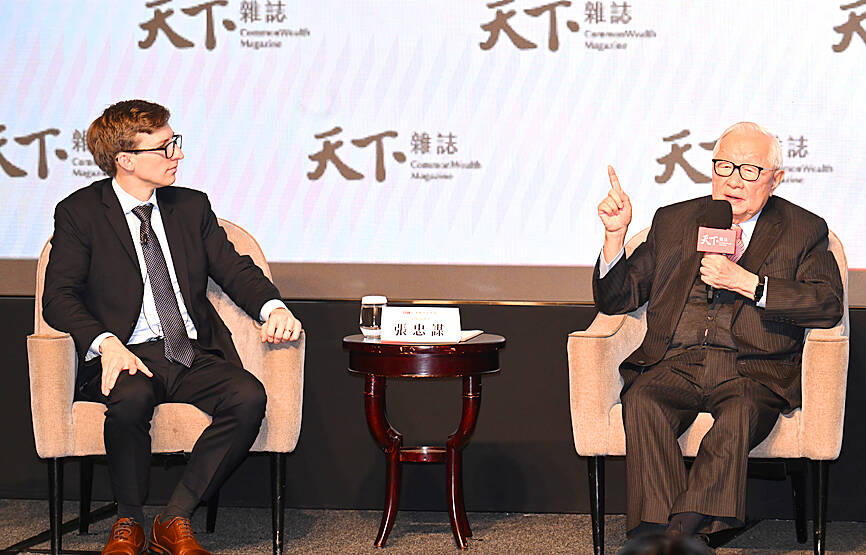Washington’s efforts to on-shore semiconductor production might lead to surges in chip prices and supply bottlenecks, Taiwan Semiconductor Manufacturing Co (TSMC, 台積電) founder Morris Chang (張忠謀) said yesterday.
The 91-year-old industry veteran said he supports parts of Washington’s effort to slow China’s progress on advanced chip manufacturing.
China is still six years behind Taiwan in making advanced chips, despite years-long efforts to catch up, Chang told a Commonwealth Magazine forum that he coheadlined with Tufts University assistant professor Chris Miller, an expert on the US-China rivalry’s effects on chip manufacturing.

Photo: Tien Yu-hua, Taipei Times
However, Chang said that other parts of the effort, particularly Washington’s on-shoring and friend-shoring policies, perplexed him.
The US already holds a lion share of 39 percent in the semiconductor sector, including chip manufacturing equipment, chip design and intellectual property, he said.
Washington has excluded Taiwan from its friend-shore list, Chang said, citing US Secretary of Commerce Gina Raimondo as saying that Taiwan is a dangerous place and the US cannot rely on it for chip supply.
"It is, I think, Taiwan's dilemma," Chang said.
However, Raimondo has not made any remarks on the issue since TSMC unveiled plans to set up fabs in the US, with investment totaling US$40 billion, he said.
Chang said he is not sure what the US wishes to achieve through its on-shoring and friend-shoring policies.
“On-shoring is in the name of security and resiliency,” Chang said, adding that even though the defense industry only needs an insignificant amount of chips, the US wants to build large domestic capacity.
The US already has 11 percent share of the world semiconductor manufacturing, he said.
“If you give up the competitive advantages of Taiwan and move to the US ... the costs are going up,” Chang said.
Chang previously estimated that chip manufacturing costs in the US would be 50 percent higher than in Taiwan.
“I found out that was an underestimate. Perhaps, a far worse underestimate than I was underestimated,” Chang said, referring to Miller’s book Chip War: The Fight for the World’s Most Critical Technology, in which the professor writes that Chang is the most underestimated businessperson of the past few decades.
Chipmaking costs in the US could be twice those in Taiwan, Chang said.
“That is going to have some impact on the further expanding ubiquity of the chips. That is one thing I can see. When the costs go up, the ubiquity of chips will either stop, or slow down considerably,” he said, calling chips the most “disinflationary item” of the past six decades.
Taiwan’s competitive advantages in chipmaking are based on its work culture, Chang said, citing his experience working for Texas Instruments Inc in the US from 1958 to 1983.
If a chipmaking tool at a Taiwanese fab breaks at 1am, it is replaced by 2am, he said.
In the US, the same issue would not be solved until the next day, he added.

MAKING WAVES: China’s maritime militia could become a nontraditional threat in war, clogging up shipping lanes to prevent US or Japanese intervention, a report said About 1,900 Chinese ships flying flags of convenience and fishing vessels that participated in China’s military exercises around Taiwan last month and in January last year have been listed for monitoring, Coast Guard Administration (CGA) Deputy Director-General Hsieh Ching-chin (謝慶欽) said yesterday. Following amendments to the Commercial Port Act (商港法) and the Law of Ships (船舶法) last month, the CGA can designate possible berthing areas or deny ports of call for vessels suspected of loitering around areas where undersea cables can be accessed, Oceans Affairs Council Minister Kuan Bi-ling (管碧玲) said. The list of suspected ships, originally 300, had risen to about

DAREDEVIL: Honnold said it had always been a dream of his to climb Taipei 101, while a Netflix producer said the skyscraper was ‘a real icon of this country’ US climber Alex Honnold yesterday took on Taiwan’s tallest building, becoming the first person to scale Taipei 101 without a rope, harness or safety net. Hundreds of spectators gathered at the base of the 101-story skyscraper to watch Honnold, 40, embark on his daredevil feat, which was also broadcast live on Netflix. Dressed in a red T-shirt and yellow custom-made climbing shoes, Honnold swiftly moved up the southeast face of the glass and steel building. At one point, he stepped onto a platform midway up to wave down at fans and onlookers who were taking photos. People watching from inside

Japan’s strategic alliance with the US would collapse if Tokyo were to turn away from a conflict in Taiwan, Japanese Prime Minister Sanae Takaichi said yesterday, but distanced herself from previous comments that suggested a possible military response in such an event. Takaichi expressed her latest views on a nationally broadcast TV program late on Monday, where an opposition party leader criticized her for igniting tensions with China with the earlier remarks. Ties between Japan and China have sunk to the worst level in years after Takaichi said in November that a hypothetical Chinese attack on Taiwan could bring about a Japanese

The WHO ignored early COVID-19 warnings from Taiwan, US Deputy Secretary of Health and Human Services Jim O’Neill said on Friday, as part of justification for Washington withdrawing from the global health body. US Secretary of State Marco Rubio on Thursday said that the US was pulling out of the UN agency, as it failed to fulfill its responsibilities during the COVID-19 pandemic. The WHO “ignored early COVID warnings from Taiwan in 2019 by pretending Taiwan did not exist, O’Neill wrote on X on Friday, Taiwan time. “It ignored rigorous science and promoted lockdowns.” The US will “continue international coordination on infectious